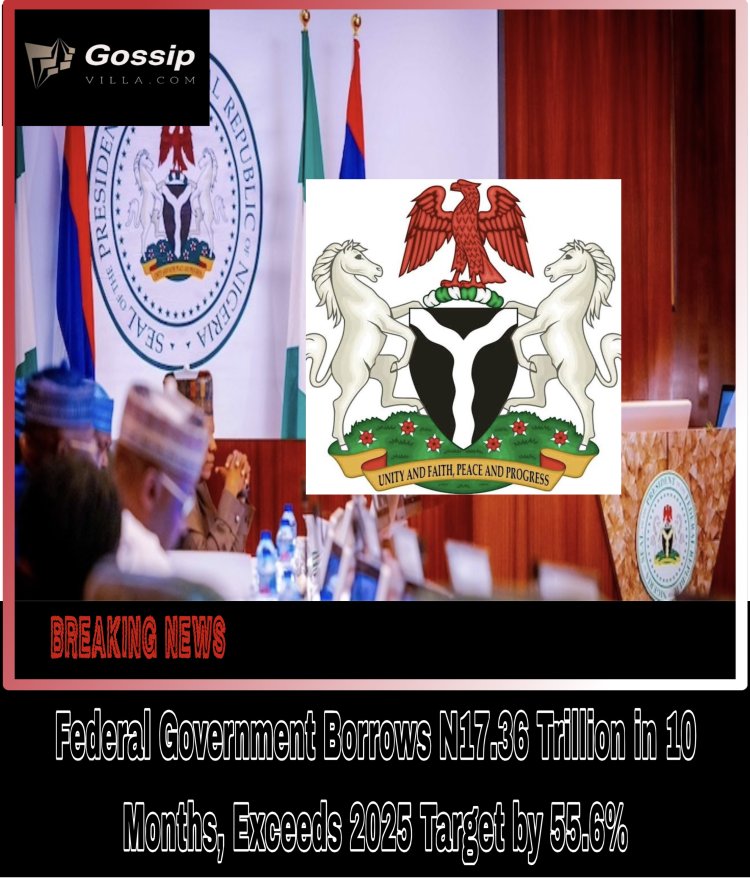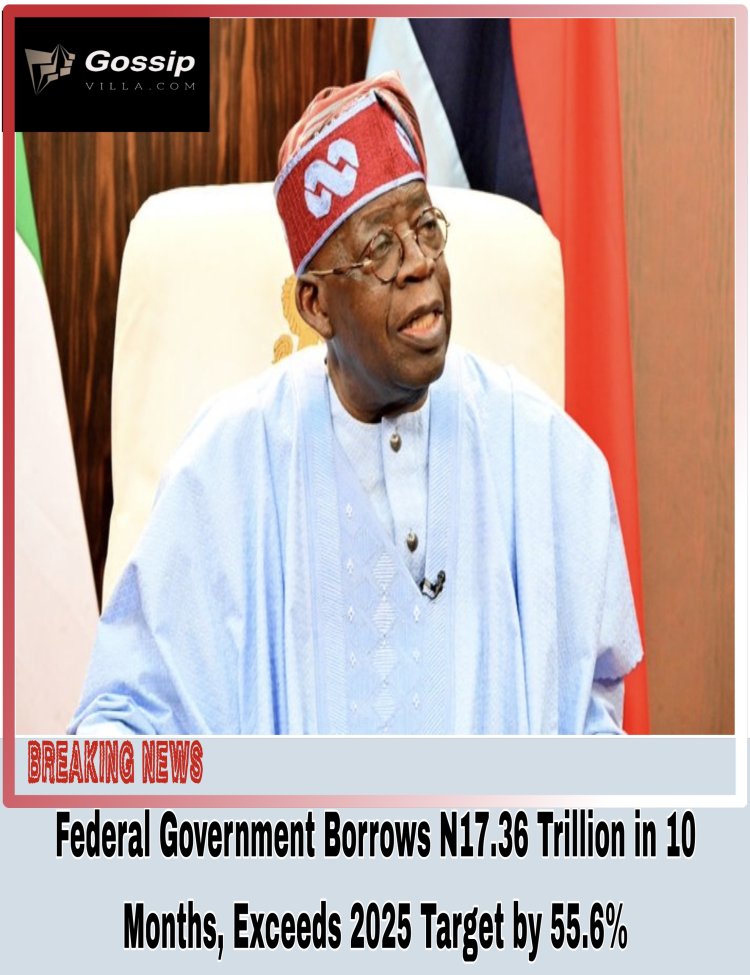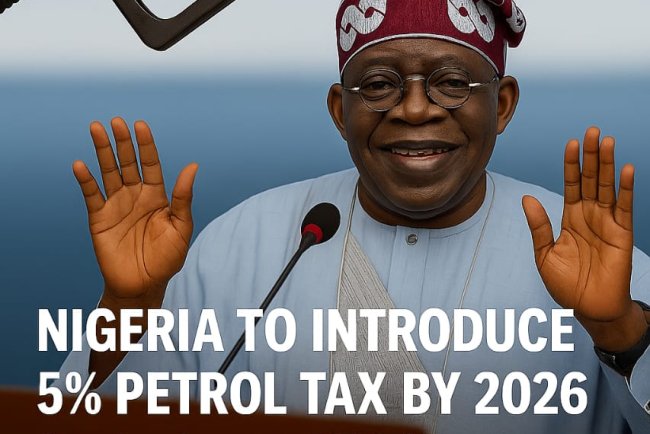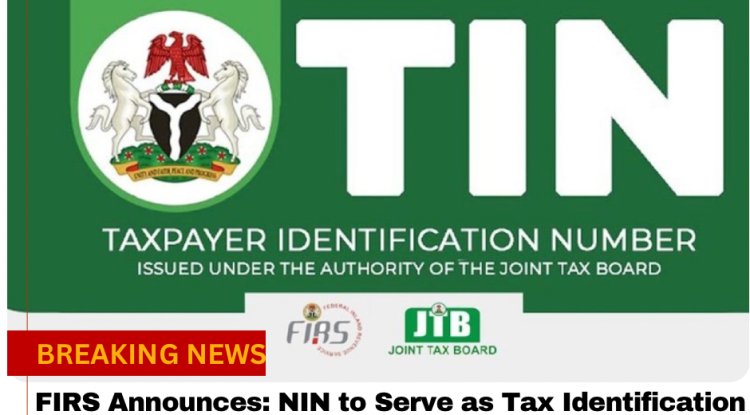Federal Government Borrows N17.36 Trillion in 10 Months, Exceeds 2025 Target by 55.6%
FG borrows N17.36tn in 10 months, exceeds 2025 target by 55.6%. Domestic debt soars amid revenue shortfalls—risking debt trap. Analysis & implications.

Federal Government Borrows N17.36 Trillion in 10 Months, Exceeds 2025 Target by 55.6%
In a development that’s raising eyebrows across Nigeria’s economic landscape, the Federal Government has racked up a whopping N17.36 trillion in borrowings from both domestic and foreign sources in just the first 10 months of 2025. This figure not only shatters the prorated borrowing limit set in the 2025 Appropriation Act but exceeds it by a staggering 55.6% that’s N6.06 trillion over the N10.9 trillion target for the period. As the nation grapples with inflation, naira volatility, and rising living costs, this news underscores the precarious tightrope walk between funding essential services and avoiding a full-blown debt crisis. But what does this mean for everyday Nigerians, and is the government’s spending spree sustainable? Let’s dive deeper into the numbers, the reasons behind them, and the potential fallout.
The Borrowing Breakdown: A Surge in Domestic Debt
To put this in perspective, the 2025 budget was built on ambitious projections: N54.99 trillion in total expenditure against an expected N41.91 trillion in revenue, leaving a N13.08 trillion deficit to be bridged primarily through loans. However, reality has bitten harder than anticipated. According to Nigeria bulletin, From January to October, domestic borrowing alone soared to N15.8 trillion, dwarfing the external component of N1.56 trillion recorded in the first half of the year.
Breaking it down further reveals a heavy reliance on short-term instruments. Treasury Bills led the charge with N11.43 trillion raised a 4.6% increase year-on-year followed by N4.042 trillion in Federal Government of Nigeria (FGN) Bonds, which actually dipped 22% from 2024 levels. Smaller but notable contributions came from FGN Savings Bonds at N40.19 billion (up 5.6% YoY) and a fresh N300 billion in Sukuk Bonds, marking a debut from zero in the previous year. This domestic frenzy signals investor confidence in government securities but also highlights the pressure on local banks and the private sector, as funds are diverted from productive investments.
Adding fuel to the fire, the government initiated a $2.35 billion (approximately N3.384 trillion) Eurobond issuance just last week, which could balloon the total borrowing to N20.74 trillion before the year ends. Analysts project that if trends hold, full-year borrowings could hit nearly N23 trillion N10 trillion (or 80%) above the annual ceiling of N13.08 trillion. It’s a stark reminder that while borrowing can plug immediate gaps, unchecked escalation risks turning short-term fixes into long-term burdens.

Why the Borrowing Spree? Revenue Shortfalls and Spending Pressures
At the heart of this borrowing bonanza lies a familiar culprit: a yawning budget deficit fueled by underwhelming revenue collection. Despite efforts by the Federal Inland Revenue Service (FIRS) to boost collections, non-oil revenues have fallen short of expectations, forcing the government to lean harder on loans to cover recurrent and capital expenditures. Unrealistic assumptions about oil revenues Nigeria’s traditional economic lifeline have compounded the issue, as global prices fluctuate and production quotas remain elusive.
High spending on infrastructure, subsidies (even as reforms loom), and governance costs hasn’t helped. The 2025 budget allocated generously for roads, power, and social interventions, but critics argue that without corresponding revenue growth, it’s like borrowing to buy time rather than building capacity. “This is a clear reflection of fiscal indiscipline and poor expenditure control,” warns Andrew Uviase, Managing Partner at Ecovis OUC, a leading financial advisory firm. He emphasizes the need for “drastic cuts in governance costs and improved transparency” to stem the tide, noting that while FIRS has made strides, broader non-oil sectors like taxation and digital economy levies are lagging.
External factors, including global interest rate hikes and geopolitical tensions affecting oil markets, have also jacked up borrowing costs. Nigeria’s external debt, now hovering around $42 billion, adds another layer of vulnerability as repayments in dollars strain forex reserves.
Economic Ripples: From Crowding Out to Debt Trap Warnings
The implications of this borrowing surge extend far beyond balance sheets, rippling into the lives of ordinary Nigerians. For starters, the heavy domestic drawdown is crowding out private sector credit banks are lending more to the government at premium rates, leaving businesses starved for affordable loans. This has already contributed to elevated interest rates, stifling investments in manufacturing, agriculture, and SMEs that could drive job creation.
On the macroeconomic front, Nigeria’s debt-service-to-revenue ratio pegged at an alarming 83% in 2024 is deemed unsustainable by experts, edging the country closer to a debt trap where more money goes to repayments than development. This not only undermines investor confidence but also jeopardizes IMF-backed fiscal reforms aimed at stabilizing the economy. As Uviase puts it, persistent overshooting amid weak revenues “risks a debt trap” and erodes the hard-won gains from recent subsidy removals and naira floats. (Nigerian eye)
For the average citizen, this translates to higher taxes down the line, potential inflation spikes from money supply growth, and delayed service delivery. With poverty rates still above 40%, the question looms: Will these loans translate into tangible benefits like better roads and power, or just perpetuate a cycle of dependency?
READ MORE ON: Nigeria’s Debt Climbs as World Bank Approves $750m Loan
Time for Fiscal Reckoning?
As 2025 draws to a close, the Federal Government’s borrowing trajectory demands urgent introspection. While loans have funded critical projects from rail lines to healthcare upgrades the opacity in spending and over-reliance on debt scream for reform. Policymakers must prioritize revenue diversification, plugging leakages in oil and non-oil sectors, and embracing public-private partnerships to ease the borrowing burden.
In the words of financial watchers, this isn’t just about numbers; it’s about Nigeria’s fiscal soul. A balanced approach combining prudent spending with robust revenue strategies could turn the tide. Until then, the N17.36 trillion milestone serves as a cautionary tale: Borrow wisely, or pay dearly.
What's Your Reaction?




















